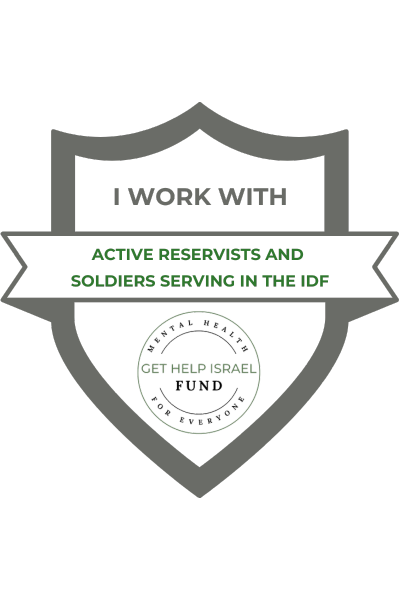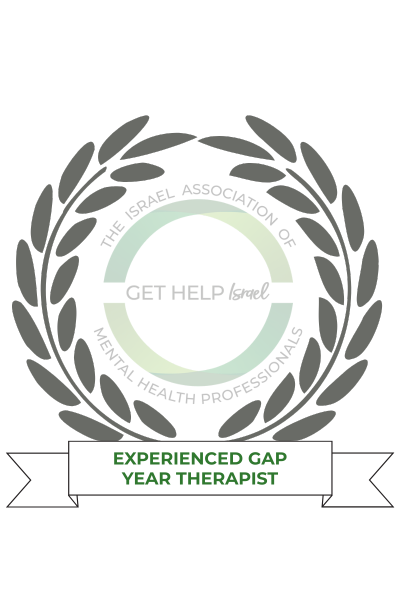Mairav Amouyal
Credentials
Art Therapist | Couples Therapist
Finances
Licensed Abroad
- Levontin 12
- Tel Aviv, 67132
- Klausner 2
- Raanana, 4336701
- Email Me
- FREE CONSULTATION
-
 Business HoursEvenings
Business HoursEvenings
Mairav Amouyal
 Verified
Verified
Credentials
Licensed Professional Counselor, Psychotherapist
Art Therapist | Couples Therapist
MA
Finances
450 NIS NIS
Private Insurance
Free Consultation | Student Discount
Soldier Discount
- Levontin 12
- Tel Aviv, 67132
- Klausner 2
- Raanana, 4336701
ABOUT THE THERAPIST
I am from Vancouver Canada. As a Registered Clinical Counselor and Art Therapist I work with Olim, young professionals, students, children (age 5+), and soldiers. I provide psychotherapy and art therapy to help clients process emotions, develop resilience, improve relationships, and gain a sense of empowerment, balance, and control. I create a safe space and a genuine relationship with my clients to enable them to be creative and feel capable of making the changes they need. I aim to help my clients by fostering courage, capability, connection, and self-worth. I provide purposeful and focused treatment, that is collaborative and shaped by client goals. I work with a level of professionalism, yet informally, authentically, and results-oriented.
I do traditional talk therapy, art therapy, and play therapy. I draw on Adlerian, Narrative, and Trauma-Focused CBT approaches in my work. Through these theoretical lenses, I provide a safe and comfortable space for my clients to process emotions or trauma, gain insight, and create unique tools for emotional regulation, communication, and personal development.
Art therapy is a powerful therapeutic approach I rely on with clients of all ages that uses creative expression to support emotional, psychological, and social well-being. I use art therapy to help clients express emotions beyond words, reduce stress or anxiety and increase a sense of emotional regulation skills. I also use art therapy to help clients with self-discovery and insight, process trauma, build self-worth, improve problem-solving and coping skills, strengthen communication, and foster a mindfulness practice.
I have years of experience working with children, teens, and adults to address challenges including intense or difficult emotions, handling stress and overwhelm, social obstacles, complex trauma, and thriving with diagnoses such as ADHD, learning disabilities, anxiety, ASD, depression, PTSD, and recovering after loss or trauma. I find it especially rewarding to work with the Olim, students, soldiers, and young professionals who have made significant life choices involved in making a move to Israel and building a life - such as experiencing loneliness or handling pressure and other challenges inherent in transitioning between different cultures and communities.
QUALIFICATIONS
MA
Adler University
2018
Degree
MAEducation
Adler UniversityYear of Graduation
2018Years in Practice
6
LICENSED ABROAD
License Number
16281 / British ColumbiaADDITIONAL CREDENTIALS
Registered Clinical Counsellor (R.C.C) #16281 - British Columbia Association of Clinical Counsellors (BCACC)
Licensed Couples and Family Therapist #6981 - Israeli Association of Couples and Family Therapy (האגודה הישראלית לטיפול זוגי ומשפחתי)
Art Therapist - Vancouver Art Therapy Institute - 2023
DISTANCE COUNSELING
Telephone Counseling, Online Therapy
PRIMARY SPECIALTIES
Anger Management
Family Issues
Life Transitions
Stress Management
Trauma / Post Traumatic Stress Disorder PTSD
ADDITIONAL SPECIALTIES
Academic
Anxiety / Panic
Attention Deficit Hyperactivity Disorder (ADHD)
Autism Spectrum
Behavioral Concerns In Children
Child Abuse
Depression
Developmental Disorders
Grief
Learning Disabilities
Parenting Issues / Training
Stress Management
Social Anxiety
CLIENT FOCUS
Population
Children
Adolescents
Adults
Men
Women
Geriatric
LGBTQ
Languages Spoken
Hebrew
English
TREATMENT APPROACH
Adlerian Psychology / PsychotherapyAdlerian therapy is a short-term, goal-oriented, and positive psychodynamic therapy. It focuses on the development of individual personality while asserting that
humans are interconnected. During therapy, practitioners pay particular attention to beliefs and behaviors that were developed by the client in childhood.
Clients’ behavior is explored in the context of their sense of ‘fitting in’ in their community and society. The goal of therapy is to acquire a more positive
and productive way of life by developing new insights, skills, and behaviors. This is achieved through 4 stages of Adlerian Psychotherapy:
1. Engagement: The client and therapist begin to establish the therapeutic relationship. The relationship consists of collaboration towards addressing the client's
problems.
2. Assessment: Gathering information about the client's life and presenting concerns. In this part of therapy, the therapist attempts to understand how the client may have developed certain styles of thinking that are no longer helpful or adaptive for them.
3. Insight: The therapist helps the client gain insight into their behavior and motivations and helps to develop new ways of thinking about his or her situation.
4. Reorientation: Encouraging the client to use their newfound insight and goals to to develop new strategies that the client can use in daily life.
Applied Behavior Analysis (ABA)Applied Behavior Analysis (ABA) is a form of therapy that is based on the principles of behaviorism. This type of therapy focuses on the use of positive reinforcement and operant conditioning techniques to teach new skills, modify behavior, and improve communication. ABA therapy is used to treat a variety of disorders including Autism Spectrum Disorder, Attention Deficit Hyperactivity Disorder (ADHD), Oppositional Defiant Disorder (ODD), and other developmental disabilities.
Art TherapyArt therapy has clients express themselves through creative mediums such as drawing, painting, collage, coloring, or sculpting. Clients can interpret their subconscious world that is expressed in their art which could lead to a better understanding of their feelings and behavior. Artistic talent is not a prerequisite for art therapy as it’s not as much about the end result as much as it is about the process. The therapist looks for meaning in the creative choices of the work and the clients’ inner world. This therapeutic method enables clients to express their inner thoughts and feelings through creative expression rather than just talking about them.
Cognitive Behavioral Therapy (CBT)Cognitive Behavioral Therapy (CBT) is a type of psychotherapy that focuses on how one's thoughts, feelings and behaviors are connected and can be changed. It is based on the idea that how we think (cognition) and how we feel (emotion) can influence how we behave. CBT helps people identify and challenge distorted thinking and replace it with more balanced thinking, leading to improved mood and behavior. ‘Homework’, usually containing practical writing exercises, is often completed by the client between sessions to reinforce the therapy. Examples of tools that practitioners often use are journaling, challenging beliefs, and mindfulness.
Expressive Arts TherapyExpressive Arts Therapy is particularly beneficial for clients who struggle with describing what they are feeling verbally. Through imagination and creation of different art forms, clients are able to interpret and communicate their inner world and catalyze healing. Expressive arts therapy can involve the use of multiple modalities, such as visual arts, music, movement, drama, storytelling, poetry, and play. It is used to help individuals of all ages, including children and adults, to explore their feelings, reconcile emotional conflicts, foster self-awareness, manage behavior and addictions, develop social skills, improve reality orientation, and solve problems.
Gottman MethodThe Gottman Method is an evidence-based approach to couples therapy that is designed to help couples strengthen their relationships and resolve conflicts. This method is based upon decades of research on thousands of couples and utilizes an approach that is both structured and collaborative. The method is designed to help couples increase respect, affection, and closeness, break through and resolve conflict, generate greater understanding, and to keep conflict discussions calm. It emphasizes the importance of self-regulation, constructive communication, and creating a safe environment for couples to talk and work through their issues. During sessions, couples work on skills such as active listening and expressing needs and feelings effectively. Couples are also given tools to identify and work through conflicts by using problem-solving techniques and developing strategies to manage emotions and reduce stress.
Mindfulness-Based Cognitive Therapy (MBCT)Mindfulness-Based Cognitive Therapy (MBCT) is a form of therapy that combines cognitive behavioral therapy with mindfulness practices. It is based on the idea that our thoughts, emotions, and physical sensations can affect our mental health. MBCT helps individuals become aware of their thoughts, emotions, and physical sensations in order to gain insight and control over them. MBCT helps clients learn how to recognize their sense of being and see themselves as separate from their thoughts and moods. This separation can free the client from thought patterns in which the repeated negative messages may be dominating the client’s focus. After developing an awareness of the separation between thoughts, emotions, and the self, people in treatment may find that while the self and the emotions may exist simultaneously, they do not have to exist within the same dimension. The healing can take place when one learns how to interject positive thoughts into negative moods and thereby create a shift in mood.
Narrative TherapyNarrative therapy is a form of psychotherapy that focuses on the stories, or narratives, of a person's life in order to help them gain insights into their situation and develop skills to make positive changes. It is based on the idea that people construct their own stories and meanings to make sense of their lives and experiences. It emphasizes the strengths, values, and skills of the person, while also exploring the influences of culture and context on their life. Narrative therapy seeks to empower individuals by helping them to identify and use their inner resources to overcome challenges and create positive change.
Person-Centered Therapy (Rogerian Therapy)Person-centered therapy, or Rogerian therapy, was developed by Carl Rogers in the 1940’s. It is a form of talk therapy that emphasizes the importance of providing psychological safety, unconditional positive regard, and empathic understanding to clients. This type of therapy is based on the belief that individuals have an innate capacity for self-actualization and self-understanding and that the therapist's role is to provide a supportive environment in which this process can take place. Through the use of active listening, open-ended questions, and non-judgmental reflection, the therapist helps the client to explore their thoughts, feelings, and experiences in a safe and accepting environment. By doing so, clients are able to gain insight into their issues, develop a greater understanding of themselves, and work towards personal growth.
Play TherapyPlay therapy is an evidence-based, developmentally appropriate form of intervention used to facilitate emotional, cognitive, and social growth in children. Play therapy is based on the premise that play is the child's natural medium of self-expression and can be used to assess and help a child work through difficult emotions, thoughts, and behaviors. The goal of play therapy is to help children develop the skills and abilities to navigate life stressors, and build self-esteem. During treatment, the therapist creates a comfortable, safe environment (a playroom) for the child to play with as few limits as possible. The toys in the playroom are intended to encourage the child to express his or her feelings and develop healthier behaviors. The child’s “play” with these toys serve as the child’s symbolic words, which may be difficult to express otherwise.
Trauma-Focused Cognitive Behavioral Therapy (TF-CBT)Trauma-Focused Cognitive Behavioral Therapy (TF-CBT) is an evidence-based practice used to help children, adolescents and their parents who have experienced a single or multiple traumatic events. This type of therapy combines cognitive and behavioral strategies to help people process their traumatic experiences, manage their distress, develop coping skills, and restore their sense of safety and well-being. TF-CBT focuses on education and skill-building, creating an environment of safety and trust, and using therapeutic activities to help people understand their responses and control their symptoms. Children are shown how perceptions may be distorted and are given the tools to redesign those perceptions. TF-CBT is a skills-based model, and it requires the child and parent to practice its components in order to be optimally effective. Parents and children are commonly asked to practice skills at home.
SERVICES OFFERED
Individual Therapy
Group Therapy
Family Therapy
Workshops/Educating
Hadrachat Horim

 Verified
Verified




